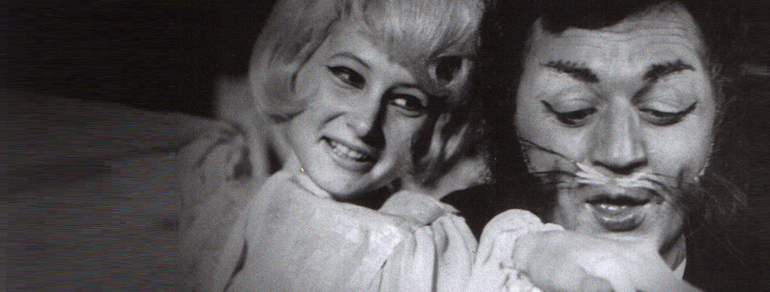Lithuanian theatre began reclaiming the right to laugh in the mid-1960s, with Povilas Gaidys' 1965 productions at the Klaipėda Drama Theatre of Alexandre Dumas' Three Musketeers in, Carlo Gozzi's The King Stag, and similar plays. The productions prompted ideological watchdogs to bemoan them as a disgraceful desecration of "noble ideals", yet they entered theatre history as "spirited stage games" full of goodhearted irony, fun revelry, and were remembered for "inventive improvisation by the actors" and contemporarily relevant interludes that tested the boundaries between stage and audience. Rimantas Venckus, „Klaipėdos dramos teatras“, in: Lietuvių tarybinis dramos teatras: 1957–1970, sudarė Algirdas Gaižutis Vilnius: Vaga, 1987, p. 185.
This frenzy's power erupted with a particular energy at the close of the 1960s and start of the 1970s. Natalya Ogai dazzled audiences at the Šiauliai Drama Theatre with her productions of Aleksander Fredro's Ladies and Hussars (1968) and Samuil Marshak's Cat's House (1970), spinning together a "festive theatrical carnaval" with an infectious playfulness of irony, parody, "satire, and clowning". Raimundas Jakučionis, „Šiaulių dramos teatras“, in: Lietuvių tarybinis dramos teatras: 1957–1970, sudarė Algirdas Gaižutis, Vilnius: Vaga, 1987, p. 231, 232. Two tastefully playful productions appeared, one after the other, on the stage of the Academic Drama Theatre, both under the direction of Algirdas Lapėnas: a staging – infused with a spirit of "farcical masquerade" – of Twelve Chairs, by Ilya Ilf and Yevgeny Petrov, in 1968, and Man of La Mancha, by Dale Wasserman and Joe Darion, in 1970 – a show and review full of harmonious "energy, frenzy and singing". Antanas Vengris, „LTSR valstybinis akademinis dramos teatras“, in: Lietuvių tarybinis dramos teatras: 1957–1970, sudarė Algirdas Gaižutis, Vilnius: Vaga, 1987, p. 64–65. The State Youth Theatre invited audiences to a production of Molière's Scapin's Deceits directed by Vytautas Čibiras in 1969, a "lively, impassioned, witty and theatrical" production adorned with "bright characters", "actorly pranks", "improvisation and contemporarily relevant interludes." Rasa Vasinauskaitė, „Valstybinis jaunimo teatras“, in: Lietuvių teatro istorija. Kn. 3: 1970–1980, sudarė Irena Aleksaitė, Vilnius: Kultūros, filosofijos ir meno institutas, 2006, p. 97.
Incidentally, one of the most curious instances of theatre censorship is associated with the production of Scapin's Deceits. It occurred in 1970 when, during one performance, actor Vilhemas Vaičekauskas, in the role of Scapin, joked about a recent airplane hijacking by Lithuanians, mentioning Turkey (the chosen destination of the defectors): "The mere thought of a trial will drive me off to Turkey!" Party officials in the audience that night remembered the speech and took decisive action: actors from the Youth Theatre were called on the carpet to explain themselves, and their actions discussed in party meetings, „Susirinkimas. Uždaras. Viename valstybės teatre“, Krantai, 1989, Nr. 5, p. 8–10. while Vaičekauskas was fired from the theatre and banned from returning to the stage.
These and other similar incidents vividly demonstrate how theatre's desire to play freely appeared very suspicious at the time. This was, though, an effort to reclaim the simplest of rights – to be a theatre, a place of unrestricted artistry and creative imagination. It was also an attempt to overhaul prevailing stereotypes of the creative work of directors and actors, to fortify a sense of stagecraft, and to develop stage innovation, versatility in imagination, and creative improvisation.
The best results from these "exercises" in the late 1970s were demonstrated by one of the most interesting stage phenomena in Lithuanian theatre in the second half of the 1970s – the creative work of Dalia Tamulevičiūtė and her "golden" group of ten actors. The "group of ten" referred to Tamulevičiūtė's first class of students that all joined the Youth Theatre together upon graduation: Kristina Kazlauskaitė, Irena Kriauzaitė, Algirdas Latėnas, Dalia Overaitė, Violeta Podolskaitė, Vidas Petkevičius, Dalia Storyk, Kostas Smoriginas, Arūnas Storpirštis and Remigijus Vilkaitis.
Their work, particularly in productions of Shoo Death! Shoo in 1976, and Jasonas in 1978, both by Saulius Šaltenis, beautifully reflected the face of a theatre that was captivated by this playful freedom, albeit in a much richer and more meaningful, existentially sensitive, and humanely sincere manner, and more subtle in its expressive forms. Invoking "a tone that was not dramatized or didactic, but playful," these productions, woven from rich imagination and basic everyday relationships, "spoke of a better, more beautiful and sensitive view of the world and of reality", Rasa Vasinauskaitė, „Valstybinis jaunimo teatras“, in: Lietuvių teatro istorija. Kn. 3: 1970-1980, sudarė Irena Aleksaitė, Vilnius: Kultūros, filosofijos ir meno institutas, 2006, p. 115. that, once seen, "made us laugh and our hearts cry". Dana Rutkutė, „Žmogus – vertybė“, in: Aktorius teatro veidrodyje, sudarė: Dana Rutkutė, Vilnius: Vaga, 1989, p. 143.
Parenthetically, a completely new manner of dramatic life in the theatre was associated with these productions. For the first time in the history of Lithuanian theatre, plays were not simply rehearsed, but were rather created during rehearsals. Cooperation among Šaltenis' and Tamulevičiūtė's group of ten actors began the Lithuanian history of "collaborative theatre" that had begun to emerge at the start of the 21st century – theatre that was the result of the collective creativity of the playwright, the director and the actor.
From the start, the creative work of Tamulevičiūtė's "group of ten" asserted a new, different conception of acting. A generation had entered Lithuanian theatre that had discovered a new freedom of existence in the theatre, one that "captivated and provoked with openness," that was "distinguished by freedom and irony and an almost bravura snub of academics," and that "dared to turn reality and real life into theatre, enriching the material of the play or character with everyday symbols, giving them the status of art and connecting theatre to life, actor to audience". Ramunė Marcinkevičiūtė, Eimuntas Nekrošius: erdvė už žodžių, Vilnius: Scena, Kultūros barai, 2002, p. 42. The debut of this generation of actors became a kind of introduction to a new chapter in the history of Lithuanian theatre. It was here, at the Youth Theatre, and with this group of young actors of the Youth Theatre, that a 1980 production of The Square, directed by Eimuntas Nekrošius, was to resonate as the manifesto of a new kind of theatre.




Comments
Write a comment